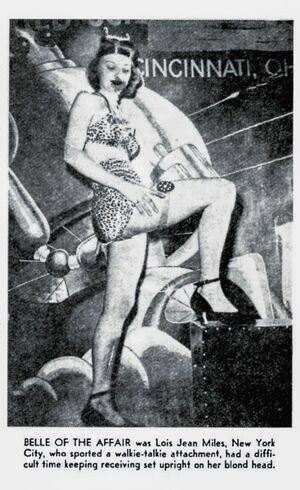1950 Worldcon Site Selection
Site selection for the 1950 Worldcon was conducted at the Cinvention on Monday September 5, 1949. The bidders were Capicon in '50 (Washington, DC), New Orleans in 1950, New York in '50, and Portland in 1950 (represented by LA fan Forrest J Ackerman).
Portland won by a tight margin[1] and went on to run NorWesCon. The order of runners-up was NY, DC, NOLA.
Joe Siclari summed it up in 1981: "the business meeting was filled with politics, with many fans scheming to keep the bid away from controversial, feud-ridden New York."[2]
Bob Tucker reported in Bloomington News Letter 13 (October 1949, p. 4):
Will Sykora bid for New York in 1950, to be followed shortly by Lester del Rey and Jerome Stanton also asking for the city. After some confusion, it developed they were not opposing the other, but that all were boosting the one city. F. J. Ackerman made the bid for Portland (having papered the hall with reams of propaganda), while Harry Moore & Paul Juneau entered New Orleans as a contender. Finally, [[Dave MacInnes|Dave made the bid for Washington DC. On the first ballot, New York copped 48 votes, Portland got 36, Washington had 29, & New Orleans only 8. The latter two were declared out of the running. On the second ballot, Portland and New York tied with 60 each, while 1 joker voted for Washington. There followed a great scurrying-about as partisans for each camp rounded up voters who were outside the hall. On the third and final ballot, Portland won with 67, the New Yorkers trailing with 63. Two ballots were declared void for voting for other cities. Ackerman began selling Portland memberships to all comers.
James Taurasi (a feuding New Yorker of the 1930s) wrote in Science, Fantasy, and Science Fiction’s post-con supplement:
I was very impressed by the open discussions and votes for the 1950 Convention site. Never in all the reports of past conventions have I read where the convention site for the next year was picked so honestly and democratically. I only hope that in future conventions this practice will be continued. The disappearance of the “smoke-filled room” in picking conventions is a sure sign that science fiction fandom is growing up. Portland won the site fair and square and I hope all fandom will go all out and support them in their ’50 Convention.
Also in Bloomington News Letter 13, Redd Boggs wrote:

After the third and final ballot […] one delegate was heard to remark with a relieved sigh: "After frittering away the whole afternoon, the convention has done the right thing." A quirk of the eyebrow elicited the information that this person feared --had New York City won-- the 1950 convention would have become a professionally dominated propaganda showcase calculated more to impress the public than to entertain fans. This belief was current at Cincinnati and Milton Rothman gave voice to it on the platform between ballots. It was also current at Toronto in 1948, when its wide acceptance had a part in removing New York from consideration for this year's event. Undoubtedly it'll play a part in future s-f conventions. Because my personal belief was that the west coast deserved 1950, I voted for Portland over New York, but I saw no reason then (or now in retrospect) to be alarmed over the possibility that New York's Hydra Club might remove the annual convention from the domination of fandom. The authors, editors, artists and agents who attend a convention are the people who really "make" such an event, but equally it would not be an s-f convention without the fans. As long as a good show is put on, it matters little who produces and directs it. […] Such propaganda tactics as foisting a "Miss Science-Fiction" on the convention are relatively harmless and since, on the one hand, they do not detract from the enjoyment and, on the other, may actually aid in enriching fandom with many bright- eyed recruits, I believe professional assistance (if not dominance) should be encouraged by all fans.
____
- ↑ 67 out of 132 votes including two invalid means 50.8% and achieving majority by a single vote. If only 130 valid votes are considered, this means 51.5% and majority by two votes.
- ↑ "Science Fiction Fandom: A History of an Unusual Hobby", in The Science Fiction Reference Book, ed. Marshall B. Tymn, p. 108.
| 1949 | Site Selection | 1951 | 1950 |
| This is page about convention bidding, the competition and its outcome. Please extend it by adding information about who was bidding, and how the race went. |